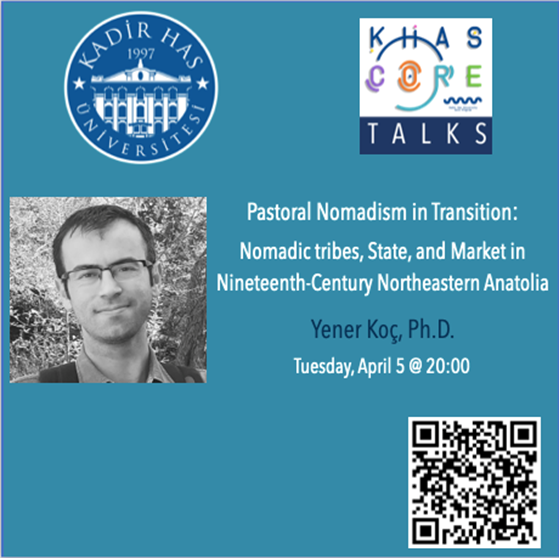
KHAS CORE Talks – Dr. Yener Koç
KHAS CORE Talks series continues with Dr. Yener Koç‘s speech entitled “Pastoral Nomadism in Transition: Nomadic tribes, State, and Market in Nineteenth-Century Northeastern Anatolia”.
You can follow the speech on Tuesday, April 5 at 20:00 on Zoom.
Registration is required for this meeting. Please fill the registration form in advance.
Abstract: This talk analyzes the political, economic, and social transformations that pastoral nomadic tribes of Northeastern Anatolia had experienced due to their direct relations with a centralizing imperial state and their integration into an expanding market during the second half of the nineteenth century. Ottoman history of this period was marked by growing state power both in the central and the frontier regions. A series of unprecedented reforms were put into practice which sought to establish direct relations with imperial subjects in the spheres of administration, taxation, and conscription during this era. The nomadic pastoral communities, who had largely remained beyond the direct access, taxation, and conscription practices of the state officials owing to their mobility, could not remain entirely immune to these new developments. While increasing infrastructural capacity of the state, sedentarization campaigns of the imperial officials, and the making of the borders encapsulated several nomadic tribes, increasing integration of the pastoral economy into a growing imperial market brought irreversible developments for the pastoral nomadic tribes of the empire. This paper will provide some remarks about how these new developments influenced migration patterns, internal structures, subsistence economies as well as the spatial distribution of the pastoral nomadic tribes of Northeastern Anatolia.
About the Speaker: Yener Koç holds a Master of Arts (2012) and a Doctorate (2020) degree in the Department of History at Boğaziçi University. In his Ph.D. dissertation titled Nomadic Pastoral Tribes at the Intersection of the Ottoman, Persian, and Russian Empires (1820s-1890s), he examines how pastoral nomadic societies of Northeastern Anatolia and Lesser Caucasus influenced from and responded to the state-making and border-making attempts of the Ottoman, Persian and Russian Empires during the nineteenth century. Currently, he is working as a post-doc researcher in the Department of History at Boğaziçi University. His main research areas are the social and economic history of the Ottoman Empire and the Middle East, pastoral economy, environmental history, and digital humanities.
